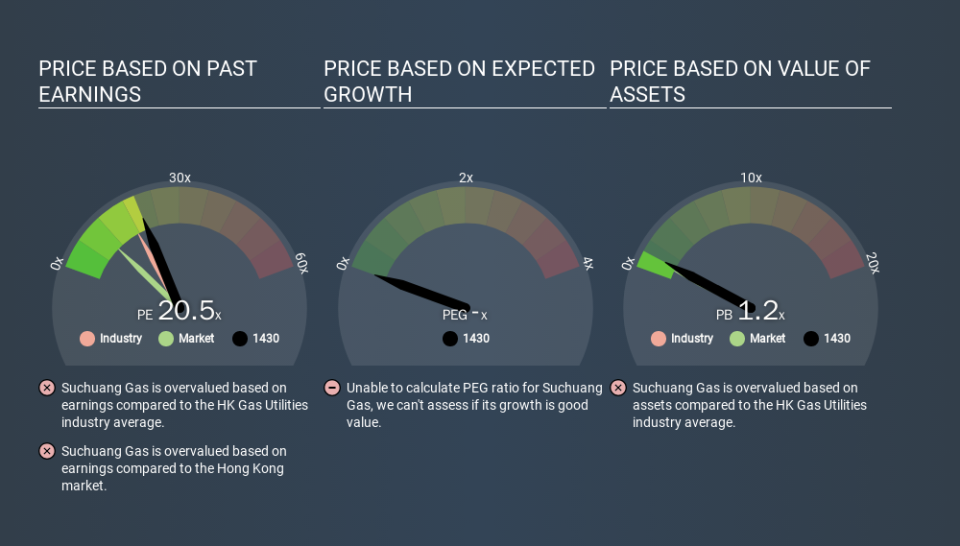Don't Sell Suchuang Gas Corporation Limited (HKG:1430) Before You Read This

Today, we'll introduce the concept of the P/E ratio for those who are learning about investing. We'll apply a basic P/E ratio analysis to Suchuang Gas Corporation Limited's (HKG:1430), to help you decide if the stock is worth further research. Suchuang Gas has a P/E ratio of 20.51, based on the last twelve months. That means that at current prices, buyers pay HK$20.51 for every HK$1 in trailing yearly profits.
View our latest analysis for Suchuang Gas
How Do You Calculate A P/E Ratio?
The formula for price to earnings is:
Price to Earnings Ratio = Share Price (in reporting currency) ÷ Earnings per Share (EPS)
Or for Suchuang Gas:
P/E of 20.51 = CNY1.78 (Note: this is the share price in the reporting currency, namely, CNY ) ÷ CNY0.09 (Based on the year to June 2019.)
Is A High P/E Ratio Good?
A higher P/E ratio means that investors are paying a higher price for each CNY1 of company earnings. That is not a good or a bad thing per se, but a high P/E does imply buyers are optimistic about the future.
Does Suchuang Gas Have A Relatively High Or Low P/E For Its Industry?
The P/E ratio indicates whether the market has higher or lower expectations of a company. You can see in the image below that the average P/E (17.6) for companies in the gas utilities industry is lower than Suchuang Gas's P/E.
Its relatively high P/E ratio indicates that Suchuang Gas shareholders think it will perform better than other companies in its industry classification. Clearly the market expects growth, but it isn't guaranteed. So investors should always consider the P/E ratio alongside other factors, such as whether company directors have been buying shares.
How Growth Rates Impact P/E Ratios
When earnings fall, the 'E' decreases, over time. That means unless the share price falls, the P/E will increase in a few years. A higher P/E should indicate the stock is expensive relative to others -- and that may encourage shareholders to sell.
Suchuang Gas's earnings per share fell by 16% in the last twelve months. And it has shrunk its earnings per share by 18% per year over the last five years. This growth rate might warrant a below average P/E ratio.
Don't Forget: The P/E Does Not Account For Debt or Bank Deposits
Don't forget that the P/E ratio considers market capitalization. That means it doesn't take debt or cash into account. The exact same company would hypothetically deserve a higher P/E ratio if it had a strong balance sheet, than if it had a weak one with lots of debt, because a cashed up company can spend on growth.
Such expenditure might be good or bad, in the long term, but the point here is that the balance sheet is not reflected by this ratio.
So What Does Suchuang Gas's Balance Sheet Tell Us?
With net cash of CN¥327m, Suchuang Gas has a very strong balance sheet, which may be important for its business. Having said that, at 20% of its market capitalization the cash hoard would contribute towards a higher P/E ratio.
The Verdict On Suchuang Gas's P/E Ratio
Suchuang Gas trades on a P/E ratio of 20.5, which is above its market average of 10.4. The recent drop in earnings per share would make some investors cautious, but the healthy balance sheet means the company retains potential for future growth. If fails to eventuate, the current high P/E could prove to be temporary, as the share price falls.
Investors should be looking to buy stocks that the market is wrong about. As value investor Benjamin Graham famously said, 'In the short run, the market is a voting machine but in the long run, it is a weighing machine. Although we don't have analyst forecasts shareholders might want to examine this detailed historical graph of earnings, revenue and cash flow.
You might be able to find a better buy than Suchuang Gas. If you want a selection of possible winners, check out this free list of interesting companies that trade on a P/E below 20 (but have proven they can grow earnings).
If you spot an error that warrants correction, please contact the editor at editorial-team@simplywallst.com. This article by Simply Wall St is general in nature. It does not constitute a recommendation to buy or sell any stock, and does not take account of your objectives, or your financial situation. Simply Wall St has no position in the stocks mentioned.
We aim to bring you long-term focused research analysis driven by fundamental data. Note that our analysis may not factor in the latest price-sensitive company announcements or qualitative material. Thank you for reading.

 Yahoo News
Yahoo News 

